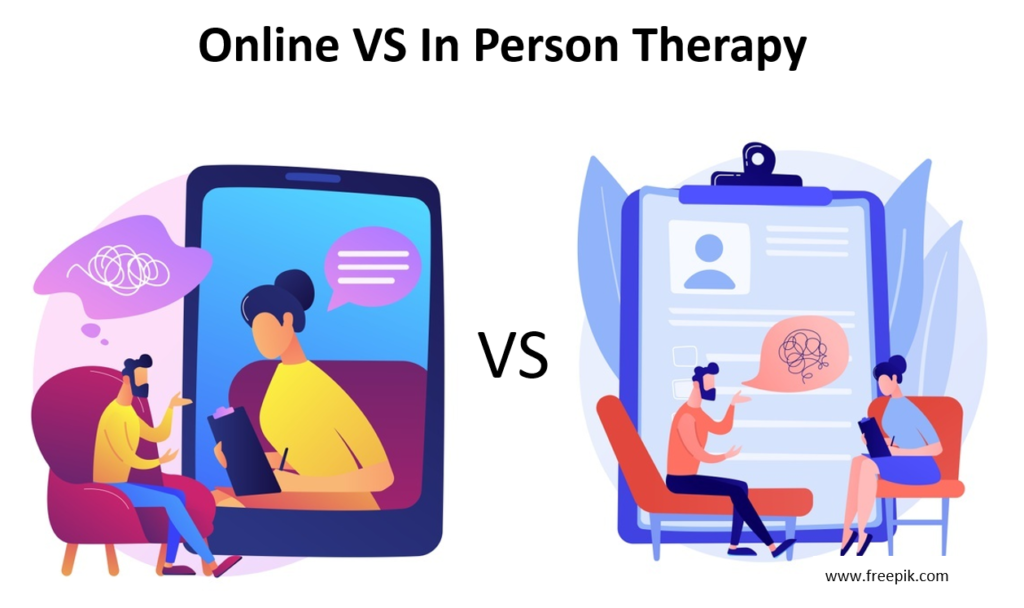Online therapy vs in-person therapy in the pandemic backdrop
As a psychotherapist / counsellor I do get at least couple of enquiries every day for in-person sessions. Personally, I have not seen clients in-person since March 2020 when the pandemic started. Though I have been offering online counselling / online therapy sessions since 10 years, for clients from other cities/countries, it is in the recent past that I have shifted to online therapy sessions to all clients exclusively over video calls.
Given the current scenario I think it is important to understand the rationale as well as the pros and cons of both modes of therapy in the background of the pandemic.
Talking about in-person therapy / counselling sessions here are my thoughts.
1. In person meetings aids the therapeutic relationship:
There is a significantly higher degree of comfort between the client and the therapist when they are sitting face to face in the same room in a safe setting. The therapeutic relationship is strengthened by the fact of being in the presence of the other. Nuances like body language, body positioning, shifts in energy, movement, gestures etc can communicate so much more to the therapist, than just the face on a video call.
2. Lack of a private space to attend sessions from:
It is a struggle for many clients to find a private space where they can feel safe to have open conversations online with the therapist. Some other clients may not want their families to know that they are attending therapy sessions. Many a times I have seen clients attend sessions from their terrace or from their cars. Clients also express concerns regarding the privacy and security wrt online platforms for communication.
3. Zoom fatigue makes it difficult to really connect online:
Recent research shows that prolonged use of video chats and video conferencing leads to a feeling commonly called zoom fatigue, tiring you out and makes it difficult to really be fully present online. When you are already on video calls most of the time for your work or school or interacting with your peers/friends/family, it becomes a drag to see your therapist also on a video call.
4. No Network or internet issues
In person meetings offer more comfort with respect to problems like technical glitches, poor network or internet connectivity issues, issues in audio or video quality etc.
Talking about online therapy / counselling sessions.
1. Offers Safety for both client and the therapist:
Attending and offering therapy from in our own comfort and safe zones, ensures safety from COVID. When meeting in person, different clients may end up occupying the same space one after the other. And even if one client is unsafe, it might impact all other clients who meet the same therapist at the same space and would be at risk.
2. Confidentiality constraints:
With respect to the control of the pandemic, contact tracing was one of the key mechanisms adopted by the Government. As a therapist I am obligated to maintain confidentiality of my clients, and at the same time contact tracing would be a legal and social necessity which would be at loggerheads with confidentiality. This would be ethical dilemma to be navigated.
3. Comfort of your own space:
When you attend counselling sessions online from your own space of comfort, you save time with respect to travel, avoid navigating traffic, skip braving the weather conditions etc.
There are both advantages and disadvantages for online therapy vis-a-vis in person therapy in the background of the pandemic. Here I would like to highlight one of the key ethical guidelines for counselling/psychotherapy – nonmaleficence.
The principles of non-maleficence and beneficence are moral principles for the counselling profession, (American Counseling Association [ACA], 2014).
The nonmaleficence principle means not causing harm to others and avoiding practices that have potential harm. The principle of beneficence is to do good towards the welfare of the client.
As a therapist, though personally I may feel that certain interventions may be more potent in person than over a video call, I also have practically seen clients make significant progress towards their identified goals through online therapy. Given that many are vaccinated today, and the risk is lower compared to when we didn’t have a vaccine, the risk still lingers. Do the benefits of in person therapy outweigh the potential for harm?
What are your thoughts? Do share in the comments section.
References:
https://news.stanford.edu/2021/02/23/four-causes-zoom-fatigue-solutions
About the Author:
Kala Balasubramanian is a certified Counselling Psychologist and Psychotherapist with a Masters in Counselling and Psychotherapy, Diplomas in Counselling and has further certifications specializing in couple/marriage/relationship counselling and family counselling. As a trained therapist, she provides professional and confidential counselling services including Individual counselling and Couples counselling / Marriage counselling.
Currently with the COVID-19 situation, all counselling services are offered online over video calls. Reach us at +91 9632146316 or write to us at counselor@innerdawn.in.


It is really a nice and helpful piece of information. I am glad that you just shared this helpful information with us. Please stay us informed like this. Thank you for sharing.